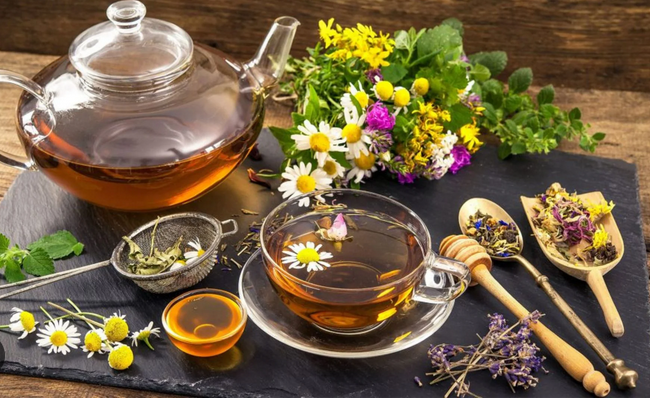Great Herbal Teas: Nature’s Healing Elixirs
In a world filled with fast-paced routines and increasing health concerns, herbal teas have emerged as a go-to beverage for those seeking relaxation, wellness, and a natural boost of energy.
Whether you’re sipping a calming chamomile tea before bed or enjoying a spicy ginger blend to ease digestion, herbal teas offer countless benefits.
In this blog post, we’ll explore some of the greatest herbal teas, their health benefits, how to prepare them, and tips for choosing the right ones for your lifestyle.
What is Herbal Tea?

Herbal tea, also known as a tisane, is an infusion made from herbs, spices, flowers, or other plant materials in hot water.
Unlike traditional teas (green, black, or oolong), herbal teas are typically caffeine-free and are celebrated for their natural healing properties.
From ancient Ayurvedic practices to modern wellness trends, herbal teas have played a significant role in promoting health and vitality.
Top 10 Great Herbal Teas and Their Benefits
1. Chamomile Tea – The Ultimate Relaxation Drink
Chamomile tea is a golden-hued herbal infusion made from dried chamomile flowers. Known for its soothing effects, it’s a popular bedtime drink.

Benefits:
- Promotes better sleep
- Reduces anxiety and stress
- Supports digestion
- Helps with menstrual pain
Best time to drink: Before bedtime
2. Peppermint Tea – Digestive Comfort in a Cup
Made from peppermint leaves, this minty tea has a refreshing aroma and taste. It’s commonly used to soothe digestive issues.

Benefits:
- Relieves bloating and indigestion
- Eases headaches
- Freshens breath
- Boosts mental clarity
Best time to drink: After meals or during the afternoon slump
3. Ginger Tea – The Immune System Booster
This zesty tea is made from fresh or dried ginger root. It’s a staple in traditional medicine for its powerful anti-inflammatory properties.

Benefits:
- Boosts immunity
- Aids in digestion
- Eases nausea and motion sickness
- Reduces muscle pain and soreness
Best time to drink: Morning or post-meal
4. Hibiscus Tea – The Heart-Healthy Elixir
Hibiscus tea, with its vibrant ruby-red color, is not only visually stunning but also rich in antioxidants.

Benefits:
- Lowers blood pressure
- Supports heart health
- Rich in Vitamin C
- Promotes weight loss
Best time to drink: Cold or hot during the day
5. Lemon Balm Tea – Calming and Uplifting
Lemon balm is a lemon-scented herb from the mint family. Its tea offers a gentle calming effect without drowsiness.

Benefits:
- Reduces anxiety
- Enhances cognitive function
- Supports digestion
- Fights cold sores
Best time to drink: Midday or early evening
6. Rooibos Tea – The Caffeine-Free Antioxidant Powerhouse
Native to South Africa, rooibos tea has a naturally sweet, nutty flavor and is free from caffeine and tannins.

Benefits:
- Rich in antioxidants
- Good for bone health
- Supports skin health
- May aid in allergy relief
Best time to drink: Anytime – especially as a coffee alternative
7. Turmeric Tea – The Golden Remedy
Also known as golden milk tea, turmeric tea is made with turmeric root or powder and is often blended with black pepper to increase absorption.

Benefits:
- Fights inflammation
- Supports joint health
- Boosts immunity
- May help manage arthritis symptoms
Best time to drink: Morning or evening
8. Dandelion Root Tea – Liver Cleanse in a Cup
Don’t overlook this backyard plant! Dandelion root tea is commonly used as a detox tea.

Benefits:
- Supports liver function
- Promotes healthy digestion
- Acts as a natural diuretic
- Helps regulate blood sugar
Best time to drink: Morning or during a detox routine
9. Licorice Root Tea – Naturally Sweet and Soothing
This naturally sweet tea is often used in blends for its flavor and medicinal properties.

Benefits:
- Soothes sore throat
- Eases respiratory issues
- Reduces stomach ulcers
- Balances hormones (use in moderation)
Best time to drink: When you feel a sore throat or during allergy season
10. Holy Basil Or Tulsi Tea
Tulsi tea is a sacred herb in Ayurveda and is known for its adaptogenic properties.

Benefits:
- Helps manage stress
- Balances hormones
- Boosts immunity
- Supports respiratory health
Best time to drink: Morning or mid-afternoon
How to Make Cup of Herbal Tea
Making herbal tea is simple, but a few techniques can enhance both its flavor and benefits.

Basic Herbal Tea Preparation:
- Boil water – Fresh, filtered water is best.
- Steep the herbs – Add 1-2 teaspoons of herbs per cup.
- Cover while steeping – This prevents essential oils from escaping.
- Steep time – Usually 5–10 minutes depending on the herb.
- Strain and enjoy – Add honey or lemon if desired.
Pro tip: For stronger medicinal properties, steep for 10–15 minutes or even prepare it as a decoction (especially for roots like ginger or dandelion).
Choosing the Right Herbal Tea for You
Not all herbal teas are created equal. Here are a few tips for selecting the best herbal teas:
1. Identify Your Goal
Are you looking to relax? Boost immunity? Improve digestion? Choose a tea that matches your need.
2. Check the Source
Opt for organic, pesticide-free herbs. Loose-leaf teas tend to be fresher and more potent than tea bags.
3. Blend for Flavor and Function
Experiment with blends. For example, chamomile + lavender for sleep or ginger + turmeric for inflammation.
4. Consult Your Doctor
Some herbal teas can interact with medications or aren’t suitable for pregnant or breastfeeding women.
Herbal Teas for Every Mood and Season
- Winter: Turmeric, ginger, cinnamon – warming and immune-boosting
- Summer: Hibiscus, peppermint, lemon balm – cooling and refreshing
- Stressful days: Chamomile, tulsi, lemon balm – calming
- Feeling sick: Ginger, licorice, echinacea – soothing
Are Herbal Teas Safe?
- Avoid excessive consumption
- Be mindful of allergies
Herbal Tea Trends in 2025
The herbal tea market is booming, thanks to increased interest in natural wellness and holistic healing. Some current trends include:
- Functional teas (targeted for sleep, detox, or energy)
- Adaptogenic blends (including mushrooms like reishi and chaga)
- Ready-to-drink herbal teas
- Sustainable packaging and ethical sourcing
Conclusion: Sip Your Way to Better Health
Whether you’re a tea connoisseur or just starting your journey into the world of herbal teas, there’s something healing and magical in every cup.
These great herbal teas are more than just beverages — they are nature’s gentle remedies, ready to support your wellness journey.
So go ahead, brew yourself a cup, and let nature nurture you — one sip at a time.



